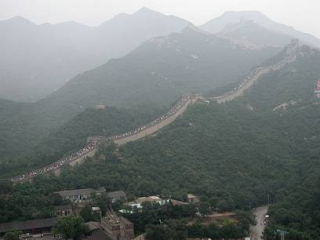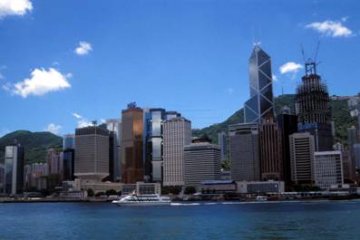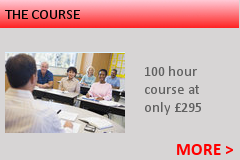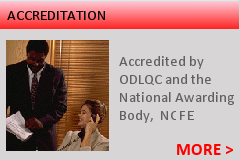

CHINA



Basic info
China has the largest population in the world, with a massive 1.3 billion people and that�s rising all the time. It is located in East Asia and its capital is Beijing. It is the world�s second largest country by land area, measuring in at 3.7 million square miles and bordering 14 nations. China�s climate mostly consists of dry seasons and wet monsoons, with winter being cold and dry and the summers, warm and wet. With China being the size that it is, it is of course difficult to summarise the weather for the country as a whole; but in the winter some parts can go down to as low as �40 degrees centigrade and in the summer as high as 38 degrees centigrade. That�s quite a difference so if you�re going for a year you may want to think about packing a swimsuit and your thermals!
Why should I go to China?
China is such a diverse country. From the massive noisy cities to the tiny quiet mountain top villages, there is something for everyone�s taste. Even the landscape is diverse with grasslands and deserts in the dry north and subtropical forests in the wet south. The Himalayas and Tian Shan mountain ranges, which include some of the world�s highest peaks, form China�s borders and have to be seen to be believed. An estimated 300 million people are learning English in China right now meaning there are more TEFL jobs here than anywhere else in the world!
What is there to see and do?
Beijing, formerly known as Peking, is the capital of China and is seen as being the political, educational and cultural centre of the country. Nearly every major building in Beijing has some national historical significance and if you want to see Chinese architecture at it�s best, here is the place to go. At the heart of Beijing is the Forbidden City, the place that was home to the emperors of the Ming and Qing dynasties and now contains the Palace Museum, which holds massive collections of Chinese art. The Donghuamen night market is also worth a look if you�re feeling brave! With dozens of stalls selling snacks such as grasshoppers, scorpions and snakes, it�s an experience that you won�t forget in a hurry!
Hong Kong is the place to go if you want to see some modern architecture, visit the world's international finance centre and of course eat in some of the finest restaurants in the world. With a population of seven million people, it is one of the most densely populated areas in the world. It is famous for it�s expansive skyline and natural harbour. Sure to have all your senses buzzing, Hong Kong is filled with neon signs on every street, bumper to bumper traffic and massive skyscrapers.
If you�re into bargain hunting then you must visit Apliu Street Market, a flea market that sells all sorts of wonders but is especially famous for its amazingly priced second hand electric goods. Temple Street Night Market is a good alternative if you like to do your shopping when it gets dark. It sells everything from clothes to cds and is especially good for food. However it is the atmosphere that makes it, with open air performances and other entertainment often taking place.
If it�s adventure that you�re after then you can�t do much better than Ocean Park. The best theme park in Hong Kong, Ocean Park has white-knuckle rides, various animals and even it�s own sea life centre. The two main sections are connected by cable car and on the way out a giant escalator will take you down to Tai Shue Wan, a picturesque cultural Chinese village.
Shanghai is the place to go if you want to live a high paced exciting life, a frontier town packed with the latest fads, fashion and technology. You will find it on China's eastern coast and it is roughly the same distance from Beijing and Hong Kong. It is the most populous city in China and in fact the world. It�s a very popular tourist town, famous for historical landmarks and ever expanding skyline. Shanghai is a thoroughly modern town, much more like Hong Kong than Beijing, although if you look closely there are beautiful old temples and traditional Chinese gardens.
One of Shanghai�s top sights and a must see for visitors is Yuyan gardens and Bazaar. The gardens are a mix of different alcoves, glittering pools and colourful rockeries as well as beautiful flowers and striking trees. It�s best to go in the morning as it�s a very popular tourist destination and gets very busy. Across from the gardens is the bazaar, a somewhat tacky but nevertheless interesting attraction, good for a browse and if you�re lucky you may even find a bargain!
Of course no visit to China would be complete without taking a look at the Great Wall of China, the two thousand year old wall that took ten years to build! There are plenty of different tours available depending on where exactly you want to go but be wary of scams that actually take you to medical centres where they try to sell you highly expensive Chinese remedies.
How safe is it?
China has one of the lowest crime rates in the world and is generally quite safe. However, petty crime such as pick pocketing is quite common, especially in the cities. You are advised to watch your wallets, purses and other personal belongings, especially in crowded areas. It is also well known for its con artists and cheats, who will often hang around in gangs. They approach people on the streets and try to change money with you etc.
As a foreigner in China you will be fairly obvious so here are a few tips for staying safe: keep your money close, avoid flashing jewellery or other expensive possessions and keep your backpack on your front rather than on your back.
What qualifications or experience do I need to have? How do I know if I�m eligible?
Full teaching Positions
Most places (although not all) in China will want you to have a university degree, in any subject, (if you don't have a degree see below) and an accredited TEFL certificate. Without this qualification you will find it hard to find work and the better (and better paid!) jobs go to those with a teaching qualification.
A teaching qualification will show that you�re dedicated and committed to teaching and will also help you feel a lot more confident once you�re in the classroom. You won�t last long if students start firing grammar questions at you and you don�t know what they�re talking about!
Please remember that to be officially qualified to teach, your course must be internationally recognised which means being at least 100 hours long and accredited by an independent accrediting body. If not, you may find it very difficult to find a school that will accept you. As convenient as they may seem at the time, weekend courses will not qualify you to teach.
Previous teaching experience is not essential in most schools in China, although some employers may be a little more fussy.
You must also hold a passport from an English speaking country ie the UK, Ireland, USA, Canada, Australia, New Zealand or South Africa. Please note INTESOL can also find opportunities for Europeans with an excellent standard of English.
You will need a Z visa, the only visa that allows you to work legally in China for a salary. Your employer should take care of this. You will also need a residence permit, which will just be a page in your passport. In some places there are age restrictions on long term Visas, meaning that people over 60 may have to wait a bit longer. With an INTESOL WORLDWIDE teaching position all this is taken care of for you.
Teaching Internships
A good way to gain experience in China, with or without a degree, and also from the age of 18 is a Teaching Internship. This allows you to be an assistant teacher in a school and is suitable for gap year students.
For teaching positions and internships click here
Are there any age restrictions?
China is one of the places where there is no upper age limit for teaching English. It is still always a good idea to check with your employer but it is doubtful that you will experience any difficulties. Great news for all those out there with a bit more life experience!
What will I earn and what currency do they use?
The Chinese use Renminbi (RMB) as their currency. As China is such a large country how much you earn really does depend on where you are working and how many hours a week. Salaries usually range from 2,600 - 9,400 RMB which is equivalent to approximately �250 - �900 (or $400 � $1400), although it is possible to get more. However please note, in China foreign exchange is very tightly controlled so you may need to look into how to convert this money into your own currency if that�s what you choose to do with it. You may have to ask for a clause in your contract.
Accommodation is usually supplied by your employer, often with internet access included, but you should be prepared to share it with other English teachers. Anything else you may get on top of your salary is down to your employer. Some will provide a contract completion bonus and some will reimburse you for your flights, but do not expect this.
Taxes aren�t bad at around 11 � 16% depending on exactly how much you are earning.
The cost of living in China can be very low, especially if you eat local food and use public transport.
What will the schools be like and what hours will I work?
Conditions and hours will vary between schools but usually you will be expected to teach 15 � 30 hours a week, although this is often negotiable. You may be expected to teach some large classes (sometimes with over 60 students!) and you will also be expected to spend time planning and marking, as with any teaching work.
The different types of school include private language schools, state primary schools, state secondary schools and teacher training colleges. The majority of TEFL jobs will be in private language schools where you will mostly be teaching teenagers, with a few students maybe in their twenties. In state schools it will mostly be younger children.
You will not be expected to speak Chinese to teach English in China, although knowing a little may help you to get by outside of the classroom. The Chinese are keen for people to learn their language and you may be able to negotiate with your contract for free Chinese lessons!
Anything else I should know?
Get hold of your contract before you leave and make sure that it states the pay, the number of hours taught and the conditions of the airfare reimbursement if there is to be one. You also need to find out if you will be paid for holidays as different employers have different policies on this.












